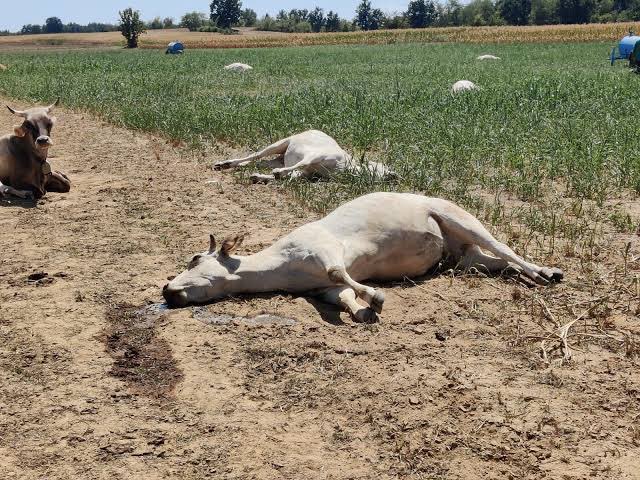Benue Farmer Arrested After 13 Cows Die In Alleged Poisoning Incident.
A farmer in Agatu Local Government Area (LGA) of Benue State, identified as Mr. Bawa Oneh, was arrested on Saturday following the deaths of 13 cows in an alleged poisoning incident. The tragedy, which occurred in Ucha village, has heightened tensions in a region long plagued by conflicts between farmers and herders, with the Miyetti Allah Cattle Breeders Association of Nigeria (MACBAN) condemning the act as a deliberate attack on their members’ livelihoods.

According to the Benue State Police Command, the cows died after consuming rice chaff allegedly laced with poison on Mr. Bawa’s farm. The Police Public Relations Officer, Chief Superintendent Catherine Anene, confirmed the arrest, stating, “I received a briefing on Sunday morning about dead cows said to have been poisoned. An investigation is ongoing, and a suspect has been arrested.” Reports indicate that seven other cows survived the incident and are currently under veterinary care.
The incident has sparked conflicting narratives. The Chairman of MACBAN in Benue State, Risku Muhammed, alleged that Mr. Bawa deliberately invited a herder to graze his cattle on the poisoned rice chaff, resulting in the deaths. “I got a report from my members in Agatu LGA that a criminal who had laced rice chaff with poison invited one of our members to come and graze on it,” Muhammed told local media. However, other sources suggest the cows may have wandered onto the farm independently, a claim that remains under investigation.
The loss of the 13 cows—part of a larger incident involving 20 cows, according to MACBAN—has caused significant distress among the herding community, who depend on their livestock for survival. Muhammed also reported that over 200 cows were stolen in a separate incident in Agatu the previous Thursday, with security forces apprehending one suspect while others fled. He accused criminal elements in communities such as Olegodege, Utigologwu, Egwuma, Akele, and Okwtanobe of targeting herders, exacerbating the insecurity in the region.
Farmers in Agatu, however, have expressed frustration over what they describe as repeated encroachments by herders onto their farmland, often leading to the destruction of crops. This incident comes amidst ongoing efforts to maintain peace in Agatu, a region with a history of violent clashes between farmers and herders. The Chairman of Agatu LGA, Melvin Ejeh, confirmed the incident and assured the public that an investigation is underway. “We have received complaints from Miyetti Allah, and an investigation is ongoing,” Ejeh said. “Agatu has been enjoying relative peace, thanks to the Peace Committee set up in the area, but it is unfortunate that some criminal elements are bent on instigating crisis and destroying the peace process.”
The broader context of this incident reflects the deep-seated farmer-herder conflict in Nigeria’s Middle Belt, particularly in Benue State. Competition for land and water resources has intensified due to population growth, climate change, and desertification, forcing herders to migrate southwards in search of grazing land. These migrations often lead to clashes with farming communities, who accuse herders of allowing their cattle to graze on cultivated fields. Historical data highlights the severity of the crisis in Agatu, with past incidents like the 2016 Agatu Massacre resulting in significant loss of life and property, often linked to disputes over land and retaliatory attacks.
In 2017, the Benue State government introduced the Open Grazing Prohibition and Ranches Establishment Law, banning open grazing and requiring herders to establish ranches for their cattle. While the law aimed to reduce conflicts, it has faced resistance from some herding communities, and enforcement has been inconsistent. Critics argue that the lack of designated grazing reserves and inadequate conflict resolution mechanisms continue to fuel tensions.
Local leaders are now calling for renewed dialogue to prevent further escalation. Chief Joseph Eche, a community leader in Agatu, stated, “This is a deeply unfortunate incident, but it highlights the urgent need for both sides to come together and find a lasting solution. We cannot continue to lose lives—whether human or animal—to these conflicts.” Earlier this year, on 11 January 2025, Agatu leaders and MACBAN held a peace dialogue in Obagaji, resolving to expose criminal elements and foster peaceful coexistence. However, incidents like this underscore the fragility of such efforts.
Experts have long advocated for sustainable solutions to the farmer-herder crisis, including the creation of designated grazing reserves, improved land-use policies, and stronger conflict resolution mechanisms. Some also point to the need for addressing systemic issues such as climate change and economic inequality, which exacerbate resource competition.
As the investigation into the poisoning incident continues, residents of Agatu remain on edge, fearing potential reprisals. The government’s response will be closely watched, with many hoping that this tragedy will spur meaningful action to address the root causes of the conflict and prevent further violence in this volatile region.


